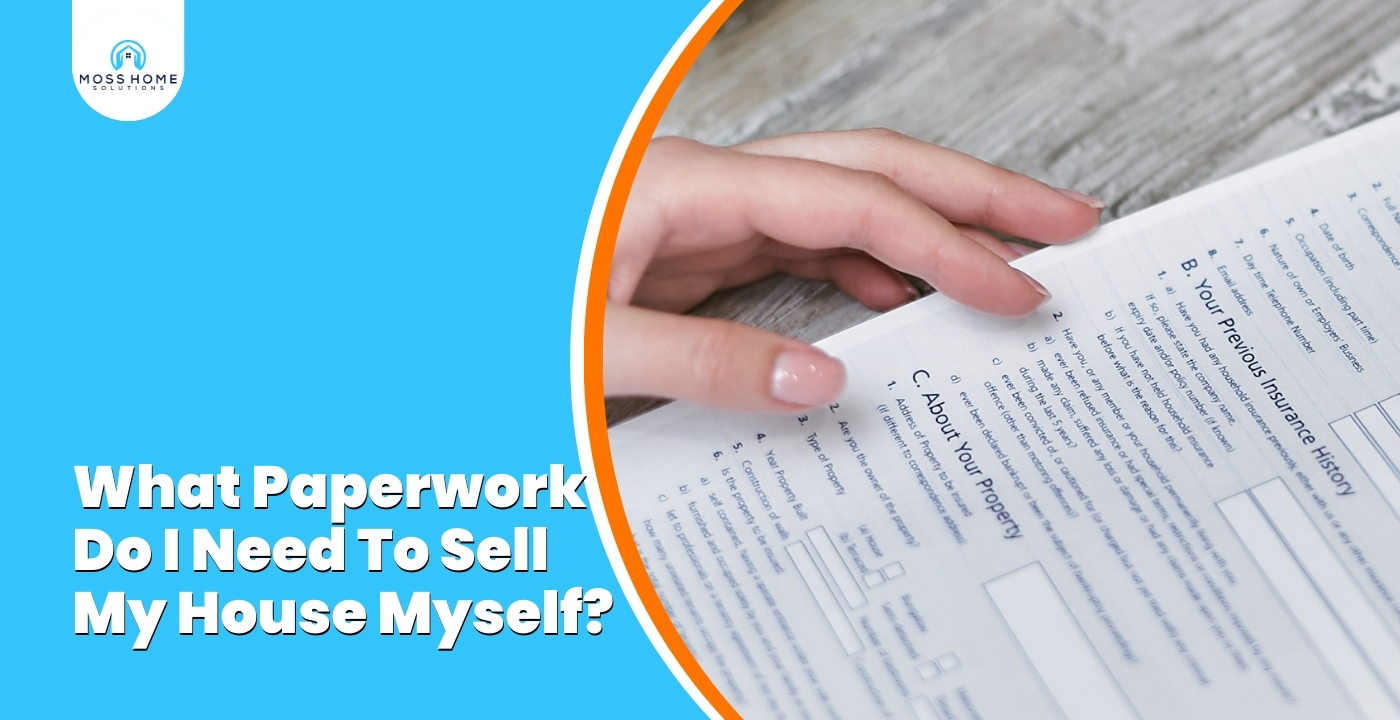Selling your house solo?
The paperwork maze can feel like a nightmare. But here’s the truth: knowing exactly what documents you need strips away the stress.
We’ll answer the burning question: What paperwork do I need to sell my house myself?
Here’s your straightforward roadmap that cuts through the complexity and puts you in control.
Key Notes
- Complete paperwork package includes ownership documents, disclosure forms, and financial statements for legal compliance.
- Cash sales require specific documentation like proof of funds and HUD-1 closing statements.
- State laws vary – consider consulting a real estate attorney to review critical documentation.
Key Documents Required to Sell Your House
When selling your house yourself, certain documents are vital to ensure everything goes smoothly.
Here’s a list of essential paperwork to keep in mind:
Ownership and Title Documents
Title Deed
The title deed is a legal document that serves as proof of ownership. This document will be transferred to the buyer upon the completion of the sale. Without it, you cannot legally sell your home.
Preliminary Title Report
This report identifies any outstanding issues related to your property, such as liens or back taxes.
Disclosure Documents
Property Disclosure Form
This form details any known issues with the property that could affect the buyer’s decision. Transparency is key; failing to disclose known problems may lead to legal issues later.
Lead-Based Paint Disclosure (if applicable)
If your home was built before 1978, federal law requires you to provide a lead-based paint disclosure. This document informs potential buyers of any hazards related to lead paint, which can pose health risks.
Compliance Certificates
Municipal Rates Clearance Certificate
This certificate verifies that all local taxes have been paid up to the date of the sale. Buyers will want to ensure there are no outstanding dues.
Financial Documents
Seller’s Net Sheet
This estimates your net proceeds after the sale and is useful for your planning.
Mortgage Payoff Statement
If you owe money on your mortgage, this statement reflects your outstanding balance, which must be settled at closing.
Additional Pre-Sale and Post-Sale Documents
Property Survey
This legal document reveals the boundaries of your property—it’s always a good idea to have one on hand.
Deed Transfer Document
This officially transfers the property ownership from you to the buyer at closing.
1099-S Tax Form
This form reports any capital gains taxes owed as a result of the sale of your property. Proper documentation helps in tax filing.
Comparative Market Analysis (CMA)
While you may not be required to submit this, it’s beneficial to determine your home’s competitive market value.
Professional Appraisal
Though optional, an accurate property valuation may help secure a buyer.
Additional Considerations
Homeowners’ Association (HOA) Documents
If your property is part of an HOA, providing the rules and regulations to potential buyers is essential. It can include financial statements that might affect their decision to purchase.
Power of Attorney Document
If you’re unable to be present at the closing, having a power of attorney will allow someone else to sign documents on your behalf, ensuring a smooth transaction.
Additional Paperwork for Cash Sales
Selling your house for cash simplifies some aspects of the transaction but still requires specific documents:
Bill of Sale
This document formally transfers ownership from you to the buyer and outlines the details of the sale.
Proof of Funds
For cash offers, the buyer must provide proof of funds, confirming they have the necessary financial resources to complete the purchase.
Closing Statement
Often called the HUD-1 form, the closing statement details all financial transactions involved in the sale, including selling price, fees, and any remaining mortgage payoff amounts.
Selling Process Checklist
To ensure you don’t miss any important steps, here’s a checklist to guide you:
Step 1: Gather Required Documents
Start by collecting all necessary documents listed above. Keeping everything organized will ease anxiety later in the process.
Step 2: Prepare Your Home for Sale
Make necessary repairs, declutter, and consider staging your home to make it more appealing to potential buyers.
Step 3: Market Your Property
Utilize online platforms, social media, and traditional methods like yard signs to reach prospective buyers. High-quality photographs and engaging descriptions are crucial.
Step 4: Review Offers and Negotiate
Once you begin receiving offers, you’ll need to review them carefully.
Be prepared to negotiate terms that work for you. Having a clear understanding of your minimum acceptable price is essential during this phase.

Key Considerations for FSBO Sales
Accuracy and Compliance
Be diligent in completing all documents accurately and adhering to state laws. Each state has its specific requirements, so make sure you check local regulations.
Consider Professional Help
Even though you’re selling independently, hiring a real estate attorney or using reputable online resources for document templates can make the process easier.
They can provide legal safeguards and ensure you’re covered in case disputes arise.
Negotiate Wisely
Be ready for negotiations and keep an open mind about potential amendments to contracts during the selling process.
Buyers may request changes, and being flexible can facilitate a smoother sale.
Frequently Asked Questions
What specific documents do I need to sell my house by owner?
To sell your house by owner, you typically need a title deed, a sale agreement, a property disclosure form, and potentially a lead-based paint disclosure if applicable. Additional documents may include closing statements and proof of funds for cash sales.
How can I ensure my paperwork is legally binding?
To ensure your paperwork is legally binding, it’s advisable to have all documents reviewed by a real estate attorney. Utilizing state-specific templates and ensuring adherence to local regulations will also help protect you legally.
Are there any costs associated with the paperwork for selling my house?
Yes, while you can prepare many documents yourself, there may be costs associated with legal consultations, appraisal fees, and necessary inspections. Additionally, costs for official document filings or notarization may apply.
Conclusion
Selling your house without a realtor requires careful organization and attention to detail.
From gathering essential ownership documents to preparing disclosure forms and financial paperwork, each step plays a vital role in completing a successful sale.
Remember to keep track of title deeds, property surveys, and compliance certificates while maintaining open communication with potential buyers. Though the process may seem complex, having the right documentation ready makes everything smoother and more manageable.
Skip the paperwork hassle altogether – contact us for a free cash offer for your home and experience a simplified selling process.





